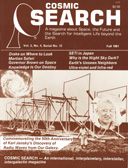![[NAAPO Logo]](../../Images/NAAPOsm.jpg) North American AstroPhysical Observatory (NAAPO)
|
|
Knowledge is Our Destiny
By: Robert H. Van Horn
"Knowledge is our destiny." So said the late Jacob Bronowski, mathematician, biologist, author and producer of the TV series, "The Ascent of Man." "Knowledge is our destiny" was a succinct summing up of his account of the growth of our knowledge of our world and the universe around us from prehistoric times to the present. It was a growth of knowledge based first on observation and then organization of these observations through thought and insight into common patterns we call theories. That body of knowledge derived from observable fact and organized by rational thought, we call science. Growth of that knowledge is indeed our destiny, for man has an ever present inner drive to know the world around him,how it works, and how to use that knowledge for his own ends.
Bronowski was not the first or only writer to associate knowledge with destiny. The ancient writers of the Book of Genesis tell how in the Garden of Eden, Eve was tempted to taste the fruit of the Tree of Knowledge of Good and Evil. Giving in to that temptation, she tasted the fruit, and in so doing she became, perhaps, mankind's first scientist. Adam joined her in the experiment, — and when it got them into trouble, he blamed the whole thing on her. This experiment, this first pursuit of knowledge changed forever the course of human history. Gaining knowledge does something irreversible for mankind. There is no going back; the gates to the Garden are forever closed.
So it has been throughout human history. In our time, we have tasted the fruit of the tree of knowledge of the atomic nucleus. It is knowledge of good and evil for it has brought us both nuclear medicine and nuclear war. And there is no return to our pre-nuclear Eden. In pre-history, man learned the principle of the wheel, bringing a marvelous easing of daily tasks on the one hand, and traffic jams and engines of war on the other. And who would go back to a pre-wheel world? Where would we be without wheels? Or paring knives and swords? Or gasoline engines and pollution?
Will our exploration of space be similar? Certainly our view of ourselves and our world from space has had an irreversible impact on us. We cannot go back to a pre-Apollo or pre-Soyuz world. Our new visions, our new technologies will bring us great benefits. But will there be another side? The military use of space may be devastating. Will there be a space litter problem? Or problems as yet unforseen?
Like all advances in knowledge, whether it turns out to be good or evil is up to us. If we approach the future in space with a reverence for the universe and all that Nature has created within it, we can have a glorious future. If we approach that future thoughtlessly with concern only for immediate gain or power, we can destroy ourselves. The choice is ours. It will take all the wisdom that we can muster to handle the new knowledge that will be ours for the taking.
|
